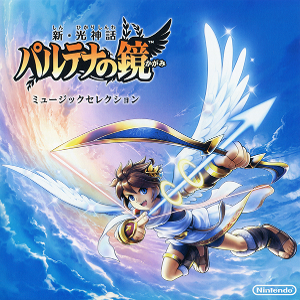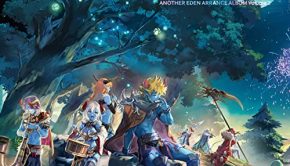Kid Icarus -Uprising- Original Soundtrack
 |
Album Title: Kid Icarus -Uprising- Original Soundtrack (Shin Hikari Shinwa -Palutena no Kagami- Original Soundtrack) |
| Record Label: Sleigh Bells |
|
| Catalog No.: SBPS-0016/8 |
|
| Release Date: August 21, 2012 |
|
| Purchase: Buy at CDJapan |
Commentary
Masahiro Sakurai – Director
An Unprecedented Project
It is understood that you can make an enjoyable shooting game by having an uptempo musical accompaniment as you go around single-mindedly blasting everything in sight. At least, that’s how it was about 20-25 years ago. I understand that modern games, on the other hand, will need more than that if they want to create an enjoyable experience.
In the initial plans for Kid Icarus: Uprising it is stated very clearly that “to match the whirlwind of changing events in the air battles, the music will need to match every development.” This was a very important part of the game’s concept, and I was aware at the time that it would be very difficult to achieve.
From the beginning, if we failed to make full use of the allotted time, we would fail to complete even a single piece or a single stage, and we wouldn’t have any freedom to adjust events to lengthen or shorten them. Just putting the data into the game could cause significant gaps to form, so in this “Fiend’s Cauldron” that kept altering the intensity of the difficulty, we needed to make sure that every bit of space was managed perfectly.
That the project was achieved so well is due to the efforts of all of the composers and sound staff who contributed, as well as the hard work on the part of everyone who worked on the game until their bodies could take no more. Although I have been making games for quite a long time now, this is the first time I’ve experienced making a project that embodies these things, and I doubt I will ever be able to make anything like it again. Of course, even though all of this music can be found on these CDs, game music was designed to fit the game. I hope that you experience it in the context of the game as well, and let it draw you more deeply into its world.
Also, I’ve taken some time to explain what I was looking for with individual pieces, so those whose interest is piqued might want to check out the samples on our website, and look at the accompanying descriptions.
Motoi Sakuraba – Composer
This soundtrack turned out to be quite an extravagant production. There were tracks using live-recorded strings, brass, and winds, tracks using synth, and those which combined both of the above, providing a good deal of variety to enjoy. Particularly with the air battle themes, which were composed to match the developments and dialogue taking place on-screen, there is a lot of development in each piece. There are also pieces that pack in any number of elements into a short space.
I also handled the main theme this time around, and I rewrote the melody over and over to get it just right. At the beginning of development, I still didn’t have a firm grasp of the game’s worldview, and the demo I wrote was really far off the mark, but I got a handle on it after a few times working it over. The final melody is rather simple, but of everything I composed for this game, it took the most effort.
I think that people who’ve been playing video games for a long while will want to listen for arrangements of some familiar melodies, as well. In some tracks they’re used prominently, but in others they are nothing more than a passing reference.
I personally loved the experience of making this album. I hope you can enjoy the world of Kid Icarus once more through this soundtrack.
Yuzo Koshiro – Composer
There were two things that I always kept in mind while composing for this project: “developing the music to match the scene” and “creating a sound that doesn’t interfere with dialogue”. With the air battles in particular, the scene would go through one change after another with a thrilling pace akin to a Disney attraction, so I tried to bring out the dynamics within the visuals. Also, I absolutely loved the dialogue between Pit and Palutena or Nature, so I looked for ways to preserve that rhythm while heightening each scene.
When production began the orchestra recordings hadn’t even been scheduled yet, and I tried my best to make the sound quality in the sequenced versions as polished as possible, but then they were transformed into live recording, and I was astounded by how much Mitsuda-san and Kameoka-san’s extremely high quality arrangements were able to recreate the originals with such accuracy, which made for a very satisfying result. Much of that quality can be heard even in the game itself, but of course I am personally overjoyed that people can have the chance to hear it in high quality on CD, where the sound can retain its full power. I hope that all fans of video game music, not simply fans of Kid Icarus, take the time to listen.
Masafumi Takada – Composer
There are certain tricks to writing music. Of course there are many different kinds of creators, but for me personally, the most relevant factor in writing a piece is to be faithful to one’s basic materials. The timing for when one starts composing for a game will differ depending on the project, but when I started on Kid Icarus: Uprising, there was already an ample amount of video footage. Great!
So, I’ll just write some music for this…then…Wha? What am I supposed to do here? That’s right, the first footage I looked at was “Chapter 5: Pandora’s Labyrinth of Deceit”. “Wait a sec, this thing the new Kid Icarus game?” my thoughts went in broken Japanese as they kept a stranglehold grip on my musical brain. My first impression was just that violent.
Just adding music to the ground battle sections made them feel complete as-is! I would create the motifs on the piano, and adding timbre to them made them complete as I had imagined them. But with the air battles… Into the Labyrinth!? It would have to be orchestral, and I would need to consider timing and development. But I want something with a beat here… man, how can I get the timing to fit exactly? By a long process of trial and error I ended up with enough music to fit one single floor’s worth.
I also have fond memories of the other pieces I worked on. In particular, after everything is reset in Chapter 19, I was playing around aimlessly on the keyboard in the evening on one of my days off, when suddenly, something came upon me!! This, this is it! I have to write it down in score before I forget! No, I won’t make it in time. I’ll record it!!! All this as it developed in a flash of inspiration. Listening to that melody I had played and recorded that night at the piano over and over, I included it as an element throughout “Lightning Chariot Base”. Ah, how thankful I am for what visited me at that moment! That’s a small record of my struggles to produce music.
Thank you everyone for buying this soundtrack!! I’m grateful! And very special thanks to Sakurai-san and Mitsuda-san!!
Noriyuki Iwadare – Composer
“I’d like some memorable melodies!”
Those are the words Sakurai-san would always say to me during production on Kid Icarus: Uprising. Pieces which I had said, “this is complete,” and performed on live instruments myself would end up being thrown out without a second thought (laughs), at any rate, my position on melody was that letting the melody be heard as it was back in the era before games had spoken dialogue, rather than emphasizing atmosphere as most game music has recently, helped to better express the emotion of a given scene, and I found myself very satisfied to remember that way of writing, thinking that this is what game music is supposed to be.
But, you know, it’s very difficult to emphasize melody while trying to match video, and as the music is going to end up being recorded with real instruments, you have to consider whether the instrument would be able to play a given part properly while arranging. The several months of production had gone by before I knew it.
And now the pieces I put so much effort into have been released on CD, where they can truly be heard! I am forever grateful. I was brought in partway through production, so I didn’t end up writing very many pieces, but I hope that you take the time to enjoy the whole album.
Takahiro Nishi – Music Director
As the only composer for this game working at the development company, I held private meetings with Sakurai-san (the game’s director), deciding which composers would be right for which parts of the game, and took on the role of music director, carrying out various adjustments as I added the music to the game. The unique characteristic of this game’s single player mode (story mode) is its combination of rail shooter air battles with third-person ground battles, and while we wanted to have the kind of uptempo music that you associate with shooting games for the aerial sections, we also wanted the music to be synchronized with the images like a movie score. Our musicians provided wonderful performances for the vast quantities of music in the game.
Although there were places in the actual game where we were forced to make compromises in sound quality because of space and memory constraints, you can enjoy the music here on CD as it was written, in the best possible sound quality. Please listen to it over great-sounding headphones or speakers. As you listen to the music once again in the form of this soundtrack, you will find that it reminds you strongly of the game’s various scenes. I hope that all of you enjoy this new Kid Icarus sound.
Natsumi Kameoka – Orchestrator
Being an arranger requires you to cover a wide range of work. You could be orchestrating something that was written for solo piano, or rewriting a piece into a completely new form, or even creating a different version of something. This time, I had to take already wonderful pieces that were complete in their sequenced form and build them up as orchestral pieces, arranging them into a form that is ready to record. That is to say, I basically have to bring the pieces into a usable form.
With the aerial battle music, we had to work hard to keep the minute links between the music and images. We recorded by section (split into strings, woodwinds, brass, percussion) to a click track, but many of the tracks were over 200 bpm, and in addition to having to make extremely minute tempo settings like 120.00096 bpm, there were a lot of ritartando (gradually slow down) and accelando (gradually speed up) markings that made the recording sessions an incredible undertaking. We put particular effort into the parts where all instruments are playing in unison (that is, the same notes), so that all of the performances would line up. I hope you will listen for it.
I’ll be remembering a lot of other things about the project as well, from the time when the percussion were being used so much that the mallets broke to the way in which the musicians, looking at the aerial battle/ground battle titles, mistook the game for a real war title.
Finally, I would like to express my gratitude to everyone who took part in the recording sessions. We may have suffered through months worth of sleepless nights, but I loved it all the same.
Yasunori Mitsuda – Composer / Album Producer
There are a number of ways to create game music, and in general you really can’t say that one is better or worse than another. For Kid Icarus: Uprising, though, I felt that using the sound of a live orchestra as our base would be the best way to match the quality of the game itself. To realize that notion, we conducted seven recording sessions, and reproduced the majority of the game’s music through live recordings. Without any doubt, I believe that this is probably the largest-scale production of any video game score to this point. For roughly four months I did nothing but orchestration and recording every single day, but I learned a lot and will remember the whole process fondly for sure.
Production began when Sakurai-san asked me to write music for the promotional video that would play at E3 2010. I took the job, but I was aware the entire time that the footage would be seen around the world, and that it would play a very important role in defining people’s perceptions of the game, so I was worried that I wouldn’t get it right. On the absolute last night before recording I stayed up late with Sakurai-san and we created it together, exchanging views as we went.
Amazingly, this score ended up involving over 150 people. All of them have given so much power to this score. It is, of course, an important score for myself as well. I hope that that power reaches listeners.
Posted on June 28, 2014 by Ben Schweitzer. Last modified on September 20, 2014.














